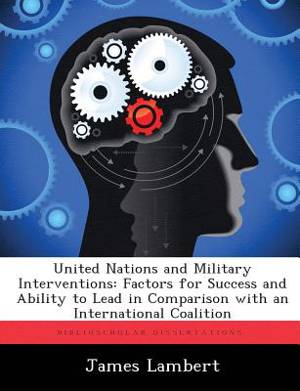
Door een staking bij bpost kan je online bestelling op dit moment iets langer onderweg zijn dan voorzien. Dringend iets nodig? Onze winkels ontvangen jou met open armen!
- Afhalen na 1 uur in een winkel met voorraad
- Gratis thuislevering in België vanaf € 30
- Ruim aanbod met 7 miljoen producten
Door een staking bij bpost kan je online bestelling op dit moment iets langer onderweg zijn dan voorzien. Dringend iets nodig? Onze winkels ontvangen jou met open armen!
- Afhalen na 1 uur in een winkel met voorraad
- Gratis thuislevering in België vanaf € 30
- Ruim aanbod met 7 miljoen producten
Zoeken
United Nations and Military Interventions
Factors for Success and Ability to Lead in Comparison with an International Coalition
James Lambert
Paperback | Engels
€ 54,45
+ 108 punten
Omschrijving
Numerous UN military interventions have taken place in the post-Cold War era. Some stand out as failure: stability efforts did not succeed and UN forces were often incapable of protecting the people. Rwanda, Somalia and Bosnia come to mind. These missions have been well documented, but are such failures representative of UN military interventions in the post-Cold War era? This question warrants an assessment of the UN's ability to lead, or in other words to plan, manage, direct and support military interventions. This monograph will perform this assessment by determining which factors really impact the success or failure of post-Cold War military interventions, and by comparing the ability of the UN to lead such interventions with that of an international alliance or coalition. It will be argued that the UN has in fact proven to be no more or no less effective than international coalitions, operating under the legitimacy of a UN resolution, in leading military interventions to success in the post-Cold War era. Only two factors greatly influence the outcome of any such interventions: the political will of the international community and the regional adversaries' interest in achieving a sustainable peace. Of these two factors, the latter is the dominant variable, and must be the focus of international efforts when setting the conditions for mission success.
Specificaties
Betrokkenen
- Auteur(s):
- Uitgeverij:
Inhoud
- Aantal bladzijden:
- 52
- Taal:
- Engels
Eigenschappen
- Productcode (EAN):
- 9781288328352
- Verschijningsdatum:
- 21/11/2012
- Uitvoering:
- Paperback
- Formaat:
- Trade paperback (VS)
- Afmetingen:
- 189 mm x 246 mm
- Gewicht:
- 108 g

Alleen bij Standaard Boekhandel
+ 108 punten op je klantenkaart van Standaard Boekhandel
Beoordelingen
We publiceren alleen reviews die voldoen aan de voorwaarden voor reviews. Bekijk onze voorwaarden voor reviews.











